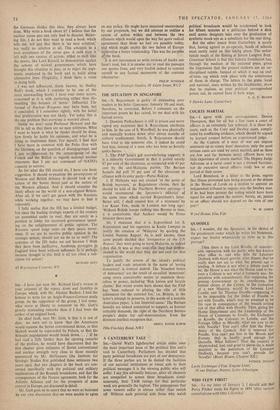SIR,-1 have just seen Mr. Richard Gott's review in your
columns of the report Arms and Stability in Europe, which, with Mr. Alastair Buchan, I had the honour to write for an Anglo-Franco-German study group. As the rapporteur of the group, I feel some- what more at liberty to comment on Mr. Gott's grossly misleading remarks than if I had been the author of an original book.
Its chief fault, says Mr. Gott, is that it is out of date: we were not to know 'that the Americans would reassess the Soviet conventional threat, or that Skybolt would be superseded by Polaris, or that the Brussels negotiations would break down. . If he had read a little further than the opening remarks of the preface, he would have discovered that the first chapter gives estimates of Soviet conventional and nuclear strength very close to those recently announced by Mr. McNamara (the Institute for Strategic Studies first published these estimates two years ago), that two chapters in the book are con- cerned specifically with the political and military implications of the Brussels breakdown, and that the consequences of the Nassau agreement, both for the Atlantic Alliance and for the prospects of arms control in Europe, are discussed in detail.
• Mr. Gott goes on to assert that we were so bemused by our own discussion that we were unable to agree
on any policy. He might have remained unconvinced by our proposals, but we did attempt to outline a course of action within and between the two alliances which would open the way for more radical agreements than those we feel are possible today, and which might enable the two halves of Europe tordevelop a better relationship. This was the purp'ose
of book.
It is not uncommon to write reviews of books one hasn't read, but it is unwise not to read the passages one quotes from, and very foolish indeed to commit oneself to any factual statements of the contents whatsoever.
PHILIP WINDSOR Institute for Strategic Studies, 18 Adam Street, WC2


































 Previous page
Previous page